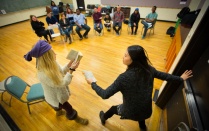Italian: Major or Minors
Why Study Italian?

Murano, Italy
Learn about the language, literature and culture of Italian-speaking world regions: Italy, but also Argentina, Canada, Switzerland, the United States and more. The undergraduate program will develop your research and analytical skills, enhance your capacity for aesthetic appreciation, strengthen your powers of observation and self-expression, and prepare you for cross-cultural, global interaction.
Jump To:
Degree Requirements
The Italian undergraduate tracks cover a wide range of disciplines and historical periods while providing linguistic proficiency and cultural fluency. Students gain breadth and depth of knowledge in Italian Studies as they earn credits necessary for fulfilling a major, a joint major or a minor.
Academic Advisement (ITA 200+)
BA in Italian
27 total credits are required as follows (including double and triple majors; for double degree combinations, see below):
- Three credits of lower (200) level coursework: ITA 207, taken prior to upper-level courses; letter grade required; minimum GPA 2.5.
- 24 credits of upper (300/400) level coursework: eight courses including ITA 322 and seven electives; three credits may be earned through an upper-level RLL course, through another course chosen in consultation with an Italian advisor, or through one of the following pre-approved courses:
- AHI 310, 317, 322, 324, 328, 330, 331, 339;
- CL 327, 328, 331, 338, 339, 340, 391, 408, 440;
- HIS 300, 305, 313, 316, 330, 337, 346, 347, 358, 359, 371, 388, 393, 394, 409, 415, 423, 428, 438;
- PHI 366, 370, 469
- Breadth in time periods and topics strongly encouraged; letter grades required; minimum cumulative GPA 2.5.
Joint Major
21 credits (with a major in another BA track in a separate department; not for double degrees):
- Three credits of lower (200) level coursework: ITA 207, taken prior to upper-level courses; letter grade required; minimum GPA 2.5
- 18 credits of upper (300/400) level coursework: six courses including ITA 322 and five electives; breadth in time periods and topics strongly encouraged; letter grades required; minimum cumulative GPA 2.5
Minor in Italian
12 credits
- Three credits of lower (200) level coursework: ITA 207, taken prior to upper-level courses; letter grade required; minimum GPA 2.5
- Nine credits of upper (300/400) level coursework: three courses including ITA 322 and two electives; breadth in time periods and topics strongly encouraged; letter grades required; minimum cumulative GPA 2.5
Minor in Italian culture
18 credits
- Twelve credits of Italian Culture core coursework: ITA 125, ITA 221 or ITA 223, ITA 323, ITA 392; knowledge of Italian not required; letter grades required; minimum cumulative GPA 2.5
- Six credits of upper (300/400) level electives: two courses, one focused on Medieval and/or Early Modern culture and one on Modern and/or Contemporary culture; knowledge of Italian not required; letter grades required; minimum cumulative GPA 2.5
Double Degree
A double degree combines a BA in Italian with, for example, a BS in Biology or a BFS in Music. Please see the Undergraduate Catalog for additional credit requirements.
Students should make an appointment with an RLL faculty advisor or the Director of Undergraduate Studies about questions on any aspect of the Italian undergraduate program referenced in this document or elsewhere.
Residency Requirement
The department requires completion of at least 50% of credits necessary for a major, a joint major, or a minor through RLL Italian coursework on a local UB campus. The remaining 50% may be fulfilled through other Italian courses at UB as well as or in combination with study abroad coursework, transfer courses, placement exams, or other pre-approved credit-earning opportunities (see below); RLL faculty advisement is recommended.
Prerequisites
Acceptance into the major, joint major, or minor degree in Italian requires satisfactory completion of prerequisites through ITA 152 or equivalent work, with a minimum cumulative GPA of 2.5. Acceptance also requires a minimum overall GPA of 2.0.
If prerequisites are not fulfilled through departmental coursework, or if UB credit has not been articulated for qualified non-UB prerequisite work, an RLL faculty advisor or the Director of Undergraduate Studies can advise and, when necessary, determine satisfaction as well as coursework levels suited to the students’ linguistic abilities.
Students who are heritage or first speakers of Italian must meet with an RLL faculty advisor before enrolling in any Italian courses to determine an appropriate level of study.
The following is a guide for completing prerequisites in the department, and shows how previous instruction may help fulfill them. RLL faculty advisors or the Director of Undergraduate Studies can assist with any questions.
| if no prior instruction | if ~ 2 years of Italian | if ~ 4 years of Italian | if ~ 6+ years of Italian |
ITA 111 (3 credits) | ITA 112 (3 credits) | ITA 201 (3 credits) | No courses required |
ITA 112 (3 credits) | ITA 201 (3 credits) | ITA 202 (3 credits) | |
ITA 201 (3 credits) | ITA 202 (3 credits) |
| |
ITA 202 (3 credits) |
| ||
Once prerequisites are complete, acceptance into the major, joint major, or minor also requires applying to the program. Application is also possible during the semester of the last prerequisite, in which case the department office will hold all paperwork until final grades are posted for the semester. Applying requires submitting a brief application along with a current Academic Advisement Report (AAR) from HUB (under Advisement, My Advisement). The application can be found on and submitted via the department’s website (rll.buffalo.edu). Hard copies are also available through the department office where the completed application and AAR can be turned in between 8.30am and 5pm EST.
Completing Required Credits
There are several ways for students to fulfill required credits for the major, joint major or minor:
Departmental Coursework (as detailed above)
- Course levels should ordinarily be completed in sequence: Course levels should be completed in sequence: foundational courses (ITA 207) must be taken before all courses at the 300 and 400 levels, unless an RLL faculty advisor or the Director of Undergraduate Studies advises otherwise. One advanced departmental course in English may be used to fulfill a maximum of three credits.
- Occasionally and by prior written permission from the Director of Undergraduate Studies, students may obtain exceptions, such as substitution of advanced courses for foundational courses, or credit for an internship or a course taken in another department toward one elective 300- or 400-level course.
- RLL faculty advisement on program and course selection is strongly encouraged two semesters prior to intended participation. For further information, visit the Office of Study Abroad or see Study Abroad with RLL.
AP or Similar Credit
- Advanced standing and university credit may be awarded to students who complete college-level work in high school. UB awards credit based on AP exam scores, IB exam scores for certificates and diplomas, GCE exam scores and CLEP exam scores. Visit University Admissions for more information.
Transfer Coursework
- As approved after review by an RLL faculty advisor and the Director of Undergraduate Studies; some course articulations are available on the TAURUS website.
Other Opportunities
- Including internships, guided creative or research activity, or independent study, all of which require approval by the Director of Undergraduate Studies.
For all study abroad, transfer courses and/or AP or similar credit, the department’s residency requirement (see above) always applies.



